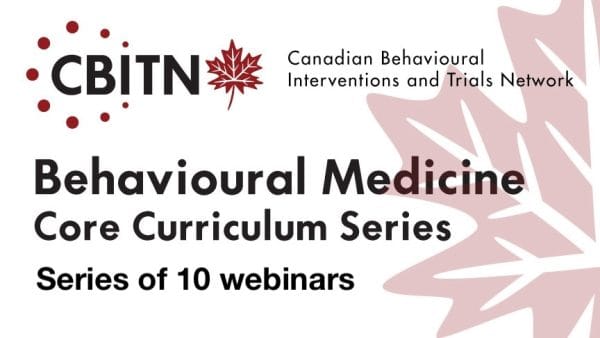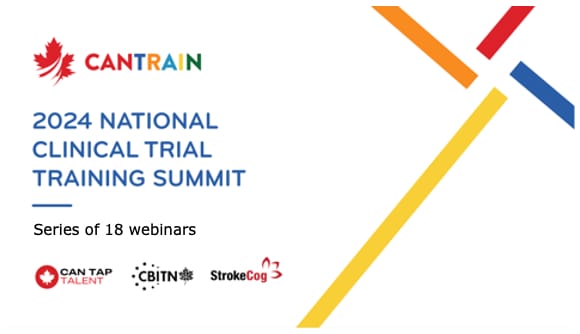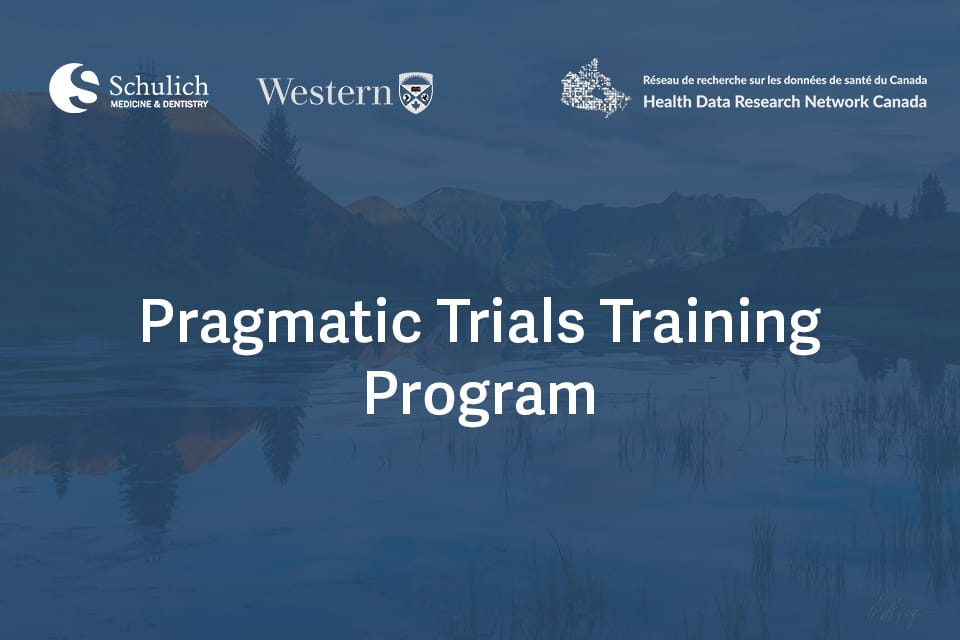WEBINAR TRAINING RESOURCES
CBITN
DISCLAIMER: Captions are automatically generated and may not be fully accurate
Towards an integrated framework for designing and testing behaviour change interventions
Prof. Simon L. Bacon, Concordia University (Canada)
________
This modules focuses on some of the major limitations in current behavioural intervention studies, explores the process of generating and testing a behavioural intervention as well as some key questions to ask of behavioural intervention studies.
46 min
Required pre-readings
Designing Effective Health Behaviour Change Interventions: Using the Behaviour Change Wheel and Beyond
Asst. Prof. Marta Marques, NOVA University of Lisbon (Portugal)
________
This modules focuses on behaviour change techniques and on differentiating frameworks, models and classification systems applicable to behaviour change interventions, explores the Behaviour Change Wheel framework and the COM-B Model of Behaviour Change, and discusses the importance of specifying and classifying components of behaviour change interventions during their development.
47 min
Required pre-readings
A Review and Comparison of Behavioral Intervention Development Frameworks: The ORBIT Model, The Science of Behavior Change (SOBC) approach, and the MRC framework
Susan M. Czajkowski, Chief of the Health Behaviors Research Branch – Division of Cancer Control and Population Sciences, National Cancer Institute (USA)
________
This module focuses on the goals and purposes of three behavioral intervention development and testing approaches, explore the key features and relationships between each of these frameworks, and also explore how best to select frameworks for the development of specific interventions.
50 min
Required pre-readings
Clinical Behavioural Trial Designs (e.g, adaptive/SMART, Pragmatic, n of 1, etc)
Assoc. Prof. Sylvie Lambert, McGill University (Canada)
________
This module focuses on evaluating behavioural interventions through different trial designs, exploring alternative trial designs used to evaluate components of a behavioral intervention and overviewing the strengths and weaknesses of each of the explored trial designs.
59 min
Required pre-readings
Outcome selection in behavioural trials: Challenges and opportunities
Prof. Kim Lavoie, Université du Québec à Montréal (Canada)
________
This module focuses on different types of trial outcomes and their purposes, the unique challenges associated with selecting outcomes for behavioural trials, and defining the benefits of core outcome sets to improve outcome selection and reporting in behavioural trials.
29 min
Required pre-readings
Optimizing Behavioral Interventions: Introduction to MOST
Asst. Prof. Kate Guastaferro, New York University School of Global Public Health (USA)
________
This module focuses on the rationale for, and process of, intervention optimization via the Multiphase Optimization Strategy (MOST) and Intervention EASE approaches and making contrasts with the classical treatment package approach.
44 min
Required pre-readings
Feasibility and Pilot (F+P) Testing
Prof. Simon Bacon, Concordia University (Canada)
________
This module focuses on distinguishing between feasibility and pilot studies and exploring the knowledge gaps around these types of studies as well as reporting in relation to these two types of studies.
54 min
Required pre-readings
Assessments in Behavioural Trials: Treatment Fidelity
Prof. Kim Lavoie, Université du Québec à Montréal (Canada)
________
This modules focuses on the importance of addressing intervention fidelity within behavioural trials, understanding fidelity and its relation to adaptation, and identifying appropriate fidelity assessment strategies.
38 min
Required pre-readings
Knowledge user engagement & designing for implementation
Prof. Molly Byrne, University of Galway, Ireland (Ireland)
________
This module focuses on engaging relevant stakeholders to maximise intervention relevance, fidelity, effectiveness, and implementation; identifying implementation barriers and enablers and selecting fit-for-purpose implementation and evaluation frameworks, strategies and techniques.
38 min
Required pre-readings
Implementation Science Theories and Frameworks to Improve Translation of Research to Practice
Assoc. Prof. Justin Presseau, University of Ottawa (Canada)
________
This model focuses on implementation science, emphasizing its theories and frameworks designed to enhance the application of research findings into practical use. It outlines the differences between frameworks that help identify barriers and facilitators to implementation and those that aid in selecting effective implementation strategies.
53 min
Required pre-readings
2024 NATIONAL CLINICAL TRIAL TRAINING SUMMIT
| # | Presenter | Title | Duration |
|---|---|---|---|
| 01 | Pr. Linda Li, BSc(PT), PhD, FCAHS | Bright Future: Training Tomorrow’s Leaders in Patient Research Partnerships | 35 min |
| 02 | Ika Washington, MSc, BSc, PhD Student | Marginalization and Equity in Research | 30 min |
| 03 | Dr. Natalie Coburn, MD, MPH | How we can make clinical trials more patient centric | 41 min |
| 04 | André Pierre Picard, OC | The future of clinical trials: patient and Community Partners Perspectives | 31 min |
| 05 | André Picard, OC Dr. Linda Hunter, RN MScN, PhD(C) Alex Haagaard, BSc, MDes Dr. Natalie Coburn, MD, MPH Ika Washington, MSc., BSc, Ph.D. Student Jeniffer EJ Monaghan, BA, LLB Maureen Smith, MEd Saeideh Mayanloo, BSc Shurjeel Choudhri, BSc(med), MD, FRCPC | Panel Discussion | 69 min |
| 06 | Pr. Barbara Bierer, BSc, MD | From theory to Practice: Development and Implementation of the JTF: Joint Task Force for clinical trials competency framework | 33 min |
| 07 | Dr. Sandra Pelaez, BEdPsy, MSc, PhD Christina Farant Monique Ostrout, BSc, DESS Katie Bainbridge, BA, MIS Dr. Linda Hunter, RN MScN, PhD(C) Mei Li, BN, MHM, PhD(C) Caroline Buote, BSc, MSc Dan Lafreniere, BSc | From the grant to the field: Challenges of developing an innovative curriculum for clinical trials | 73 min |
| 08 | Munaza Jamil, BSC, CCRA | Crafting a common language: standardized role profiles for clinical research professionals in Canada | 24 min |
| 09 | Dr. Andrea Furlan, MD, PhD | De-monopolizing knowledge in communities of practice with case-based learning: All teach, all learn | 21 min |
| 10 | Dr. Suzanne Morin, MD, MSc, FRCP, FACP Damaris Javier, MA Dr. Lisa Goos, BScH, BEd, MA, PhD | Supporting accessibility, diversity and equity in mentorship program | 28 min |
| 11 | Dr Kieran Quinn, MD, PhD | Pragmatic lessons in the design of advanced clinical trials | 34 min |
| 12 | Anna Heath, MMath, PhD | The Art of Biostatistics in Clinical Trials | 39 min |
| 13 | Dr. Lauren Kelly, MSc, PhD, CCRP | Increasing capacity of Maternal and Paediatric Clinical Trials in Canada | 41 min |
| 14 | Pr. Kim Lavoie, PhD, FCPA, FABMR | Why all trials are behavioural trials - Opening Remarks | 13 min |
| 15 | Pr. Simon Bacon, PhD, FTOS, FCCS, FABMR | Towards an integrated framework for designing and testing interventions targeting physical activity, diet, and other health risk behaviours: why some of the major trials have 'failed' and how we can do better | 39 min |
| 16 | Pr. Genevieve Rouleau, MSc, PhD | Why should we care about implementation science in health-related research | 29 min |
| 17 | Pr. Michael Vallis, PhD, R.Psych | How clinical trials can benefit from incorporating a behavioural science perspective: challenges and opportunities | 52 min |
DISCLAIMER: Captions are automatically generated and may not be fully accurate
Bright Future: Training Tomorrow’s Leaders in Patient Research Partnerships
Linda Li, BSc(PT), MSc, PhD, FCAHS
Senior Scientist, Implementation Science, Arthritis Research Canada
________
35 min
Marginalization and Equity in Research
Ika Washington, MSc., BSc, Ph.D. Student
Critical Health Sociologist, Public Health Practitioner, Patient, and Founder of Diversity Talk
________
30 min
How we can make clinical trials more patient centric
Natalie Coburn, MD, MPH
Senior scientist, at Sunnybrook Research Institute; Professor at University of Toronto
________
41 min
The future of clinical trials: patient and Community Partners Perspectives
André Pierre Picard, OC
Reporter Health columnist, The Globe and Mail
________
31 min
Panel Discussion
| André Picard, OC (Moderator) | Reporter Health columnist, The Globe and Mail |
| Dr. Linda Hunter, RN MScN, PhD(C) (Chair) | National Coordinator Trialists Stream, CANTRAIN |
| PANELISTS | |
| Dr. Linda Hunter, RN MScN, PhD(C) (Chair) | National Coordinator Trialists Stream, CANTRAIN |
| Alex Haagaard, BSc, MDes | Equity-Centered Design Strategist Patient Partner, Pain BC, Co-Chair, Knowledge Mobilization and Implementation Science Committee, Chronic Pain Network |
| Dr. Natalie Coburn, MD, MPH | Senior scientist Sunnybrook Research Institute; Professor at University of Toronto |
| Ika Washington, MSc, BSc, PhD Student | Critical Health Sociologist Public Health Practitioner, Patient, and Founder of DiversityTalk |
| Jeniffer EJ Monaghan, BA, LLB | Patient Partner STROKECOG Executive Committee |
| Maureen Smith, MEd | Patient Partner Adjunct Professor, University of Toronto Dalla Lana School of Public Health, ACT Consortium, Patient Engagement & Training Committees member, Co-lead INFORM RARE Patient Engagement, IMPaCT Parent/Youth Engagement Lead |
| Saeideh Mayanloo, BSc | Site Engagement Lead AstraZeneca |
| Shurjeel Choudhri, BSc(med), MD, FRCPC | SVP and Head Medical & Scientific Affairs, Pharmaceuticals, Bayer Inc |
69 min
From theory to Practice: Development and Implementation of the JTF: Joint Task Force for clinical trials competency framework
Faculty Director, Multi- Regional Clinical Trials Center of Brigham and Women’s Hospital and Harvard University; Director, Regulatory Foundations, Ethics and Law Program, Harvard Clinical and Translational Science Center Director, SMART IRB
________
33 min
From the grant to the field: Challenges of developing an innovative curriculum for clinical trials
| Dr. Sandra Pelaez, BEdPsy., MSc, PhD | National Director Clinical Trials Training Programs’ Streams, CANTRAIN |
| Christina Farant | National Coordinator Graduate & Postdoctoral Trainee Stream, CANTRAIN |
| Monique Ostrout, BSc, DESS | National Coordinator Clinical Research Professionals Stream, CANTRAIN |
| Katie Bainbridge, BA, MIS | National Coordinator Trialists Stream, CANTRAIN |
| Dr. Linda Hunter, RN MScN, PhD(C) | National Coordinator Trialists Stream, CANTRAIN |
| Mei Li, BN, MHM, PhD(C) | Team Leader Clinical Research Educator, CANTRAIN |
| Caroline Buote, BSc, MSc | Team Leader Program Designer & Developer, CANTRAIN |
| Dan Lafreniere, BSc | Clinical Research Educator CANTRAIN |
73 min
Crafting a commom language: standardized role profiles for clinical research professionals in Canada
Munaza Jamil, BSC, CCRA
McMaster Continuing Education Instructors, Faculty, Applied Clinical Research Program, McMaster University
________
24 min
De-monopolizing knowledge in communities of practice with case-based learning: All teach, all learn
Physician-Scientist, UHN – Toronto Rehabilitation Institute, CAN-TAP-TALENT
________
21 min
Supporting accessibility, diversity and equity in mentorship program
Co-Investigator, National Research, Mentoring Network-Resource Center (NRMN-RC)
________
28 min
Pragmatic lessons in the design of advanced clinical trials
Clinician-Scientist, Sinai Health, Department of Medicine, University of Toronto, Adjunct Scientist, ICES; Clinical trials Co-lead, Pan Canadian Palliative Care Research Collaborative
________
34 min
The Art of Biostatistics in Clinical Trials
Scientist, Child Health and Evaluative Sciences Program, SickKids Research Institute; Assistant Professor Division of Biostatistics, University of Toronto
________
39 min
Increasing capacity of Maternal and Paediatric Clinical Trials in Canada
National Principal Applicant, IMPaCT , Associate Professor in the Department of Pharmacology and Therapeutics, University of Manitoba
________
41 min
Why all trials are behavioural trials - Opening Remarks
Professor & Chair of Behavioral Medicine, University of Quebec at Montreal
________
13 min
Towards an integrated framework for designing and testing interventions targeting physical activity, diet, and other health risk behaviours: why some of the major trials have 'failed' and how we can do better
Professor and CIHR SPOR Chair in Innovative, Patient-Oriented, Behavioural Clinical Trials, Health, Kinesiology and Applied Physiology
________
39 min
Why should we care about implementation science in health-related research
Professor – Université du Québec en Outaouais; Affiliate Researcher – Institute for Health System Solutions and Virtual Care, Women’s College Hospital; Institut du Savoir Montfort
________
29 min
How clinical trals can benefit from incorporating a hevavioural science perspective: challenges and opportunities
Associated Professor, Family Medicine – Dalhousie University
________
52 min
Pragmatic Trials Training Program
| # | Títle | Presenter | Time |
|---|---|---|---|
| 01 | Welcome - Program Lead | Dr. Amit X. Garg | 4 min |
| 02 | Program Overview | Dr. Taylor McLinden | 6 min |
| 3a | Exemplar Trial Intro - EnAKT LKD | Dr. Amit X. Garg | 2 min |
| 3b | Exemplar Trial Overview - EnAKT LKD | Dr. Amit X. Garg, et al. | 13 min |
| 3c | Exemplar Trial Overview- AToM (Ambulatory Toxicity Management) | Dr. Amit X. Garg, et al. | 13 min |
| 4a | Exemplar Trial - AToM | Dr. Monica Kryyzanowska | 14 min |
| 4b | Exemplar Trial - AToM | Dr. Monica Kryyzanowska | 14 min |
DISCLAIMER: Captions are automatically generated and may not be fully accurate
Welcome – Program Lead
Dr. Amit X. Garg
________
Dr. Amit Garg (Western University) welcomes learners to the program.
4 min
Program Overview
Dr. Taylor McLinden
________
An overview of key details for learners accessing resources related to the program.
6 min
Exemplar Trial Intro - EnAKT LKD
Dr. Amit X. Garg
________
Introduces the exemplar EnAKT LKD pragmatic trial and the curriculum wheel.
2 min
Exemplar Trial Overview - EnAKT LKD
Dr. Amit X. Garg, et al.
________
Overviews EnAKT LKD, a pragmatic, 2-arm, parallel-group, open-label, registry-based, superiority, cluster randomized clinical trial to evaluate the effect of a multicomponent intervention designed to target several barriers that prevent eligible patients from completing key steps towards receiving a kidney transplant.
13 min
Exemplar Trial EnAKT LKD
Dr. Amit X. Garg, et al.
________
Breaks down the EnAKTLKD trial across the 12 sections of the curriculum wheel.
13 min
Exemplar Trial Overview- AToM (Ambulatory Toxicity Management)
Dr. Monica Kryyzanowska
________
Summary: Dr. Monika Krzyzanowska overviews AToM (“Ambulatory Toxicity Management”), a multicentre pragmatic cluster randomised trial to evaluate the effect of proactive, nurse led, telephone basedmanagement of symptoms on the number of visits to the emergency department or admissions to hospital.
13 min
Exemplar Trial - AToM
Dr. Monica Kryyzanowska
________
Drs. Monika Krzyzanowska and Melanie Powis break down the AToM trial across the 12 sections of the curriculum wheel.
14 min




